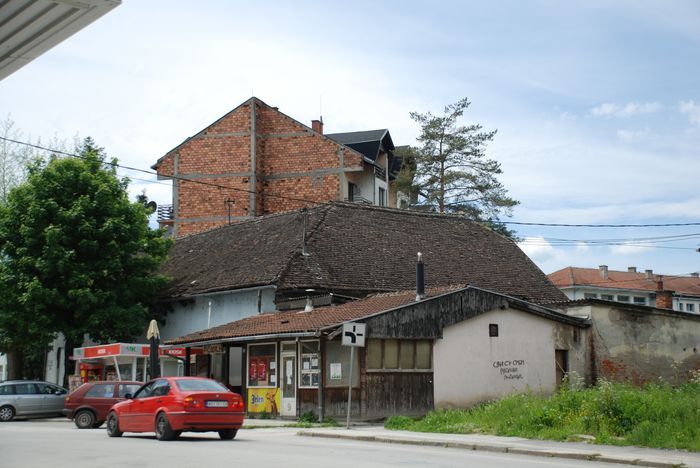The view of Constantinople from the Golden Horn, whether seen from the bridges that cross the harbour, or from Pera, is universally admitted to be as impressive and beautiful a spectacle as any city in the world can present. The visitor of a day recognises its wonderful attractions at the first glance, and long familiarity never allows one to feel satisfied that he has given to the scene all the admiration which it deserves. The dominant feature of the view is lordliness, although beauty is almost equally manifest Men spoke truly when they conferred upon New Home the title “ The Queen of Cities,” for the aspect of the city is not only lovely, but carries in its aspect the unmistakable air of the majesty and authority that befit the capital of a great Empire. Here is an eye “to threaten and command.”
The city spreads itself before you for some three miles on both sides of the Golden Horn, seated upon hills that rise steeply from the water s edge, and lift the long and wide panorama high into view. The buildings are packed close together, and rise tier above tier from the shore to the summit of the hills. Great mosques, rectangular buildings surmounted by domes and flanked by graceful minarets, occupy the most commanding positions, and crown the city with a diadem of oriental splendour.
The Golden Horn, one of the finest harbours in the world, where the war-ships of a nation may ride at ease, and great merchantmen can moor along the shore, is so inwoven with the city as to be its principal thoroughfare, its “ Grand Canal,” alive with boats of every description, and spanned by bridges over which the population streams to and for in great tides.
The city is generally irradiated by an atmosphere of extraordinary clearness, brilliance, and warmth of colour. Sometimes the solid earth seems transfigured by the light into a glorious spiritual essence. Early in the morning, Constantinople is often shrouded in a thick veil of mist, and, as the sun gains strength, it is beautiful to see the veil gradually rent at different points, and the objects it covered emerge, piece by piece, one by one, now here now there, a dome, a minaret, a palace, a red-tiled roof, a group of cypresses, as though a magician was constructing the city anew in your presence, until the immense capital gleams before you in its mighty proportions and minute details.
Nor is the vision less memorable towards sunset, when the lights and shadows paint this varied surface of hills and valleys, of land and water, while the long array of mosques and minarets upon the hills overhanging the Golden Horn rests against the deepening glory of the sky. It is the vision which Browning saw with a poet’s eye:—
Over the waters in the vaporous West the sun goes down as in a sphere of gold behind the arm of the city, which between, with all that length of domes and minarets, athwart the splendour, black and crooked runs Like a Turk verse along a scimitar.
The portion of the Golden Horn to the east of the Galata Bridge is crowded with foreign steamships, among which those bearing the flags of Britain, France, Austria, Italy marriage under comet, Germany, Greece, and Boumania, are the most conspicuous.
It may not be to the credit of the country, nor for its greatest advantage, that so much of the commerce of the place should be in foreign hands, but this gathering of the nations in the harbour of the city is imposing; it is an indication of the central position occupied by the city in the world’s affairs, and contributes largely to form the cosmopolitan character for which Constantinople is distinguished. Here the nations assemble to compete with one another as nowhere else in the world, at least in a way so manifest and decisive. This was a feature of the life of the city also before Turkish days.
Subjects of the Byzantine Empire
There was a time, indeed, during the Middle Ages when the commerce between the East and the West was exclusively in the hands of the subjects of the Byzantine Empire, when the merchants of Constantinople were the merchant princes of the civilised world. But not to speak of the interference of the Saracens with the trade of the city, the formidable competition of the Italian Maritime States began to make itself felt towards the close of the eleventh century, and from that time onwards became more and more serious until it well- nigh destroyed the business carried on by the native inhabitants.
This was due partly to the enterprise of the Italian merchants, and partly to the policy which purchased the aid of the Western States against the foes of the Empire by means of commercial concessions which proved detrimental to domestic trade. It was thus that Alexius Comnenus secured the help of Venice against the Normans, and that Michael Palaeologus obtained the support of the Genoese, when, in 1261, he undertook the task of recovering Constantinople from its Latin occupants.



